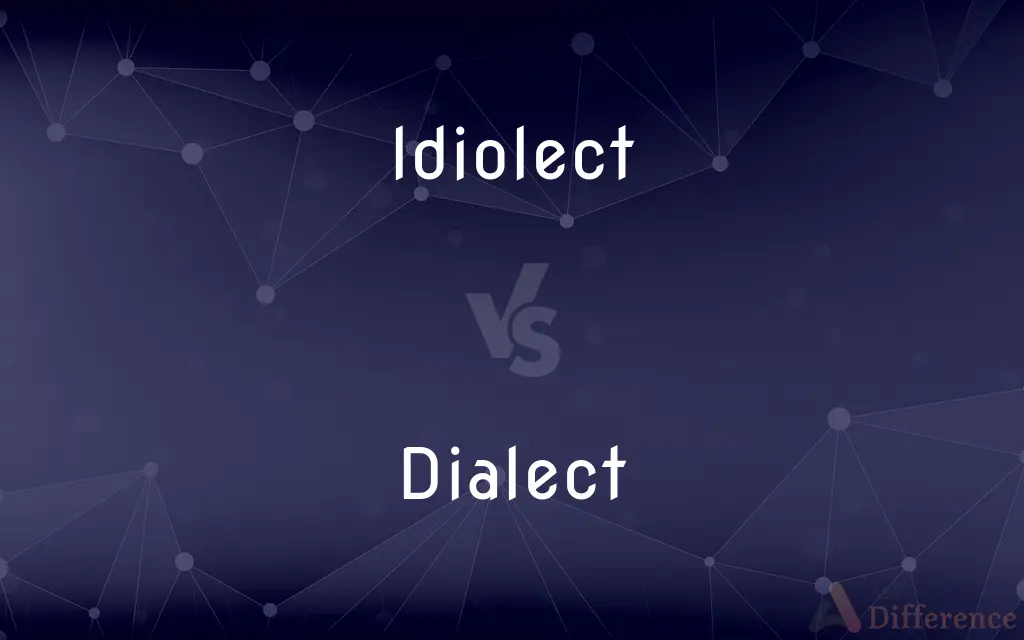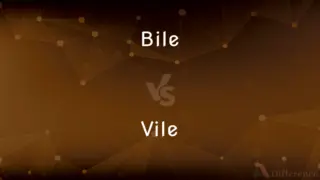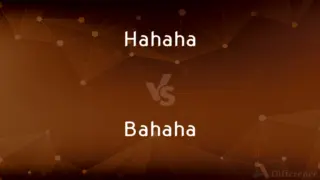Idiolect vs. Dialect — What's the Difference?
By Urooj Arif & Maham Liaqat — Updated on March 18, 2024
An idiolect is the unique way an individual speaks, reflecting personal language use, while a dialect is a regional or social variation of a language shared by a group.

Difference Between Idiolect and Dialect
Table of Contents
ADVERTISEMENT
Key Differences
An idiolect represents the distinctive speech patterns, vocabulary, and grammatical preferences unique to an individual, shaped by personal experiences, education, and social interactions. It is essentially a personal dialect. Whereas a dialect encompasses the linguistic characteristics common to a specific group of people, often defined by geographical regions or social affiliations, reflecting shared influences and cultural identity.
While an idiolect is highly personalized and varies even among members of the same family or community, highlighting the individuality in language use, dialects serve to identify and unite groups, showcasing the collective linguistic identity that distinguishes them from others. The contrast lies in the scope of uniqueness versus shared linguistic traits.
Idiolects evolve over a person's lifetime, influenced by changes in environment, social circles, and personal development. This dynamic nature of idiolects illustrates how individual language use is a reflection of one's evolving identity and experiences. On the other hand, dialects may also evolve but over longer periods, as they reflect broader societal shifts, migrations, and cultural transformations.
The study of idiolects is crucial in fields like forensic linguistics, where individual speech patterns can provide important evidence. Dialects, however, are studied to understand linguistic diversity, historical language changes, and the sociocultural factors that influence language use on a larger scale.
Idiolects and dialects both contribute to the richness of language and its capacity to convey not just information, but also personal and cultural identity. While one emphasizes individual uniqueness, the other highlights communal bonds and cultural heritage.
ADVERTISEMENT
Comparison Chart
Definition
The unique language use of an individual, including speech patterns, vocabulary, and grammar.
A variation of a language specific to a certain region or social group, including accents, vocabulary, and grammar.
Basis of Variation
Personal experiences, education, and social interaction.
Geographical location or social affiliation.
Function
Highlights individuality in language use.
Identifies and unites groups, showcasing collective linguistic identity.
Evolution
Changes with individual experiences and personal development.
Changes over longer periods due to societal shifts and cultural influences.
Study Relevance
Important in forensic linguistics for identifying individuals.
Studied to understand linguistic diversity and sociocultural influences on language.
Compare with Definitions
Idiolect
The verbal signature of a person, as unique as a fingerprint.
The poet's idiolect is evident in her choice of metaphors.
Dialect
A form of language spoken by members of a specific area or group.
The dialect of rural Appalachia has been studied for its historical linguistic features.
Idiolect
A person's unique use of language, reflecting individual speech patterns.
His idiolect includes unusual idioms from various languages.
Dialect
A regional or social variant of a language with distinct pronunciation, grammar, and vocabulary.
The Southern dialect is known for its unique expressions and vowel sounds.
Idiolect
A reflection of personal history and experiences in language use.
His idiolect has evolved to blend urban slang with academic language.
Dialect
A variation in language reflecting geographical, social, or ethnic differences.
The Cockney dialect is traditionally associated with working-class Londoners.
Idiolect
The individual dialect comprising one's unique linguistic choices.
Despite moving abroad, his idiolect retains traces of his hometown dialect.
Dialect
A linguistic expression of regional or social identity.
Urban dialects often incorporate slang that's popular among the city's youth.
Idiolect
The linguistic footprint of an individual, distinguishable by others.
Her idiolect is marked by a distinctive pronunciation of 's' sounds.
Dialect
The collective linguistic traits distinguishing one group from another.
Immigrant communities often maintain dialects as a link to their cultural heritage.
Idiolect
The speech of an individual, considered as a linguistic pattern unique among speakers of that individual's language or dialect.
Dialect
The manner or style of expressing oneself in language or the arts.
Idiolect
Idiolect is an individual's unique use of language, including speech. This unique usage encompasses vocabulary, grammar, and pronunciation.
Dialect
The term dialect (from Latin dialectus, dialectos, from the Ancient Greek word διάλεκτος, diálektos 'discourse', from διά, diá 'through' and λέγω, légō 'I speak') can refer to either of two distinctly different types of linguistic phenomena: a variety of a language that is characteristic of a particular group of the language's speakers. Under this definition, the dialects or varieties of a particular language are closely related and are often mutually intelligible, especially if close to one another on the dialect continuum.
Idiolect
(linguistics) The language variant used by a specific individual.
Dialect
A particular form of a language which is peculiar to a specific region or social group
The Lancashire dialect seemed like a foreign language
Idiolect
The language or speech of one individual at a particular period in life.
Dialect
A regional or social variety of a language distinguished by pronunciation, grammar, or vocabulary, especially a variety of speech differing from the standard literary language or speech pattern of the culture in which it exists
Cockney is a dialect of English.
Idiolect
The language or speech of one individual at a particular period in life
Dialect
A variety of language that with other varieties constitutes a single language of which no single variety is standard
The dialects of Ancient Greek.
Dialect
The language peculiar to the members of a group, especially in an occupation; jargon
The dialect of science.
Dialect
A language considered as part of a larger family of languages or a linguistic branch. Not in scientific use
Spanish and French are Romance dialects.
Dialect
A lect (often a regional or minority language) as part of a group or family of languages, especially if they are viewed as a single language, or if contrasted with a standardized idiom that is considered the 'true' form of the language (for example, Cantonese as contrasted with Mandarin Chinese or Bavarian as contrasted with Standard German).
Dialect
A variety of a language that is characteristic of a particular area, community, or social group, differing from other varieties of the same language in relatively minor ways as regards grammar, phonology, and lexicon.
Dialect
(pejorative) Language that is perceived as substandard or wrong.
Dialect
A language existing only in an oral or non-standardized form, especially a language spoken in a developing country or an isolated region.
Dialect
A variant of a non-standardized programming language.
Home computers in the 1980s had many incompatible dialects of BASIC.
Dialect
(ornithology) A variant form of the vocalizations of a bird species restricted to a certain area or population.
Dialect
Means or mode of expressing thoughts; language; tongue; form of speech.
This book is writ in such a dialectAs may the minds of listless men affect.Bunyan.The universal dialect of the world.
Dialect
The form of speech of a limited region or people, as distinguished from ether forms nearly related to it; a variety or subdivision of a language; speech characterized by local peculiarities or specific circumstances; as, the Ionic and Attic were dialects of Greece; the Yorkshire dialect; the dialect of the learned.
In the midst of this Babel of dialects there suddenly appeared a standard English language.
[Charles V.] could address his subjects from every quarter in their native dialect.
Dialect
The usage or vocabulary that is characteristic of a specific group of people;
The immigrants spoke an odd dialect of English
He has a strong German accent
Common Curiosities
How is a dialect formed?
Dialects form through the linguistic practices of a community, influenced by historical, geographical, and social factors.
Can a person belong to multiple dialect groups?
Yes, individuals can use elements from multiple dialects, especially if they are part of diverse communities or have moved between regions.
Can someone's idiolect change over time?
Yes, an individual's idiolect can change due to new experiences, influences, and personal development.
What role does society play in the development of dialects?
Society influences dialects through shifting demographics, cultural trends, and social interactions.
Do dialects influence perceptions of identity?
Dialects can strongly influence how individuals and groups perceive themselves and are perceived by others, often carrying social and cultural significance.
How can someone's idiolect reveal their background?
An idiolect may reflect a person's regional origins, education level, social circle, and other personal experiences.
What distinguishes an idiolect from a dialect?
An idiolect is the unique language use of an individual, while a dialect is a language variation shared by a regional or social group.
Is it possible to study a person's idiolect systematically?
Yes, through detailed analysis of their speech or writing patterns, focusing on unique linguistic features.
Why are idiolects important in forensic linguistics?
Idiolects can help identify individuals in legal contexts, as each person's language use has unique characteristics.
How do dialects evolve in response to changes in society?
Dialects evolve as communities adapt to social changes, technological advancements, and interactions with other language groups, reflecting the dynamic nature of language.
How do idiolects and dialects contribute to linguistic diversity?
They add layers of variation to language, reflecting the complex ways in which human experiences and social structures influence language use.
Are dialects considered less formal than standard language?
Dialects are not inherently less formal but may be perceived as such in contexts where a standardized language form is valued.
Can the study of dialects help preserve cultural heritage?
Yes, documenting and studying dialects can play a key role in preserving linguistic and cultural histories.
Can learning a new language affect your idiolect?
Learning a new language can introduce new elements into an individual's idiolect, enriching their linguistic repertoire.
How do idiolects affect communication within a language?
While idiolects add richness to language, they can sometimes lead to misunderstandings if individuals' language uses differ significantly.
Share Your Discovery

Previous Comparison
Bile vs. Vile
Next Comparison
Hahaha vs. BahahaAuthor Spotlight
Written by
Urooj ArifUrooj is a skilled content writer at Ask Difference, known for her exceptional ability to simplify complex topics into engaging and informative content. With a passion for research and a flair for clear, concise writing, she consistently delivers articles that resonate with our diverse audience.
Co-written by
Maham Liaqat














































